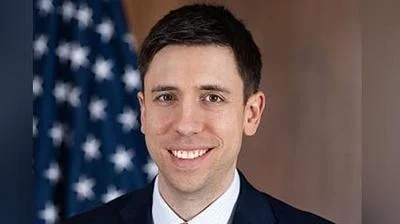Gov. J.B. Pritzker | Photo Courtesy of Gov. J.B. Pritzker Facebook
Gov. J.B. Pritzker | Photo Courtesy of Gov. J.B. Pritzker Facebook
Last week, the Chicago Tribune Editorial Board pointed out how Illinois Democrats used the redistricting process as an incumbent protection plan to reelect their members.
Yet, even the new legislative maps passed this week may not be enough to ensure Democrats can hold onto power.
That is because 2022 is shaping up to be a good year for Republicans. Public opinion is turning as people see what Democrats deliver when entrusted with complete control of state and federal government.
Let’s start with Governor Pritzker. Unlike legislative district lines, Illinois’ state boundaries are unlikely to change in the next 14 months, so Pritzker can't count on the Democrats' considerable cartography skills to help him secure reelection.
But he surely wishes he could because despite winning in 2018 with 54.5% of the vote, he never really earned support from the majority of Illinoisans. Voters soured on then-Gov. Rauner and President Trump, they did not embrace Pritzker’s governing vision. Shortly after being sworn in, only 40% of voters approved of Pritzker's job performance, according to a Morning Consult poll taken at the time.
In this environment, Gov. Pritzker should have worked to earn support and trust by building consensus and looking for compromise. Instead, he set out to make Illinois the "most progressive state in the nation" and champion an unpopular graduated income tax hike.
Voters took note. In 2020, 53% of people voted against the graduated income tax despite Pritzker putting the full weight of his office and campaign behind it. Voters sent a clear message that they don’t share Pritzker's high tax governing vision.
Now, as Pritzker kicks off his reelection campaign, he can’t run on his record: high property taxes, unsustainable pensions, rampant corruption, and increasing crime all add up to a state where embattled families aren't materially better off than they were three years ago. This record leaves voters wondering what has changed since electing Gov. Pritzker?
That is why Pritzker's campaign strategy appears to be to inundate voters with TV ads to create a poll-tested persona of providing "strong leadership" during the COVID-19 pandemic. But the slick ads don’t match his real-world record. For example, the LaSalle Veterans' Home doesn’t make an appearance in his ads. Neither does the horribly managed Department of Employment Security.
Pritzker’s political position remains tenuous because voters see through the ads. Only 41% of voters had a favorable impression of the Governor, according to a poll conducted by 1892 Polling earlier this year.
Having failed to consolidate support and without a strong record to run on, Pritzker will soon sign the redistricting legislation and break his promise to voters. Though gerrymandered maps can't save the Governor from the 53% of voters who rejected his cornerstone issue, he will use it to keep his legislative allies in his corner.
But, legislative Democrats have their own challenges to worry about.
In addition to sharing Pritzker's failed policy record, the new day promised with the election of Speaker Welch and President Harmon hasn't come to pass. They haven’t passed laws to curtail corruption, provide property tax relief, or address Illinois’ underlying fiscal challenges.
Even the bills Gov. Pritzker and legislative Democrats have passed may turn out to be liabilities. Democrats passed, and Pritzker signed 24 tax and fee hikes, which certainly won't be popular with voters. And they have continued providing special privileges for the politically connected, including raising their own pay.
Earlier this year, Democrats pushed through their criminal justice reform package, which critics claim defunds the police at a time when crime is one of the top issues facing families. In a WGN News/Emerson College poll last month, 44.2% of Chicago respondents said their top concern was crime, an issue Democrats don’t seem to have any answers to.
Compounding these factors is a national environment trending against Democrats. According to FiveThirtyEight's presidential approval tracker, President Biden's net approval rating stands at 46.2%, down from 52.1% in July.
Nationally, voters are looking at Biden’s policies and second-guessing their decision to give Democrats complete control. Biden's approval rating on his handling of the economy is down 4% since July. Likewise, his approval rating on Afghanistan is down 24%. Even on his response to COVID, Biden’s approval rating has slipped by 10%.
Combining this problematic national environment with their lamentable record, is it any wonder why Gov. Pritzker, Speaker Welch, and Senate President Harmon abandoned their fair-maps pledges for partisan political advantage?
Redistricting is the Democrats' incumbent protection plan. Without a record to run on or solutions to Illinois' pressing problems, it is their only hope for holding onto power.
Mark Cavers is the president of the Illinois Opportunity Project.





 Alerts Sign-up
Alerts Sign-up